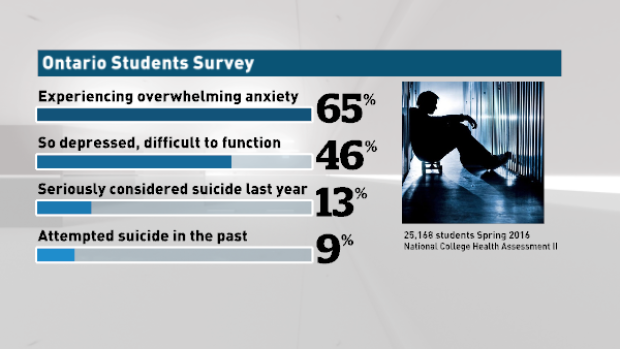By Sveta Soloveva
A recent survey of 25,000 Ontario students has found rising rates of student anxiety, depression and suicide attempts, CBC reports. However, some Humber specialists say a lot of people don’t know the definition of depression and confuse it with stress.

OUCHA student survey/Courtesy of CBC
OUCHA president Meg Houghton said 20 Ontario colleges and universities participated in the survey. Most schools chose to do the survey online, while some conducted it in person.
“Almost half of students reported feeling so depressed in previous year, that was difficult to function. And that’s up from 40 percent in 2013.”
Student Life Program assistant Graham Budgeon says he agree that depression is a serious problem, but he says the definition of mental illness has become very loose
“I think that a lot of people falsely use terms because they are not properly educated on what the symptoms are. So it is very easy to say something like, oh, I’m sad, but you are just using depressed instead,” said Budgeon.
Budgeon says he would believe the survey if that amount of students were clinically diagnosed with mental health illnesses.
“Everyone gets anxious, as much as it defines an illness, that is something that’s a little bit more heavily personal and long lasting,” Budgeon said.
Clinical depression is when people are experiencing severe sadness, lost of interest in activities for two weeks or more, Humber registered nurse with mental health focus, Dana Nunes said.
“We have a lot of people who come in with mental health issues,” said Nunes. “Somebody may come in a crisis. They are crying; they may be depressed, suicidal, very anxious. We would see them and work through their crisis and see what their needs are.”
Some Humber students said school creates a lot of pressure and stress. Pressures at home or work can make things worse.
Hospitality Event Management student Jaskarana Singh said he always feels positive and healthy, but thinks depression comes from family and personal problems, such as feeling lonely or being cheated on. Singh suggests that people never hesitate to share their problems with other people:
“If you are alone, you will be depressed very fast. Share your problems with your friends. Everyone has their own things, but if you share, at least you will get satisfaction. Maybe people will give you some good ideas.”
“I came from Sri Lanka, and this is a new environment for me. So many quizzes. There are language problems. It’s kind of stressful. But it’s not depression,” said a Business Management student Jithendri Kuda Athuruguri.
She says she thinks students could get depressed because, for example, they have no family and have to live alone.
“I felt anxiety when my grandmother passed away,” said a Business Administration student Rizwan Khan. “Sadness is slightly different from anxiety. It can be when someone is bullying you or putting you down.”
In addition to counsellors at Humber Wellness Centre, there are accessible learning services that work with students to relieve stress from school or problems at home. If the counsellors notice any physical risk caused by anxiety, they send students to doctors at Humber’s Wellness Centre. Ignite, Humber’s student federation, has services as well.
Nunes said anxiety awareness is increasing because there’s more talk about mental health in general, and people feel more comfortable talking about it.
Sometimes people can be sad for three days. Nunes said even if it is technically not depression, they should share their worries with someone before they become more serious mental issues.
Although dealing with mental health problems is individual for everyone, the prevention is similar for all kinds of anxiety. The first thing would be learning how to balance work, school and family. Relaxation is very important. And finding time to watch a favourite show, go for a walk or exercise are helpful too, said Nunes.

